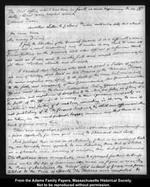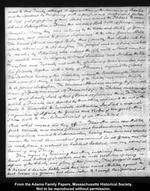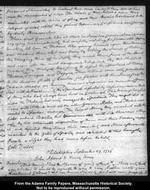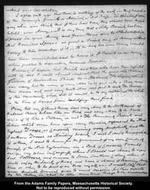The Post Office, which has been in fault, is now beginning to do its duty. Dont you neglect yours.
Colonel Tudor.
Another Letter to Colonel Tudor, without a date, but about the same time.
My young Friend.
I pity the Situation of the General, because it is a difficult, a dangerous and a most important one. I make it my Rule to cover all Imperfections in the Generals, and other Officers of inferiour rank as well as I can, and to make full and ample Allowances for all their Virtues, Merits, and Services.
I recollect that Polybius, who was as great a judge of War as any of his Age, was loud in his Praises of the Roman Troops. He never imputed any defeat, to the fault of the men, but, universally to the folly and incapacity, of their Commanders. Our Generals and other Officers must learn the same justice and Policy. General imputations of Cowardice and impatience of discipline to the Men, are false, or, if true, it is the fault of the Officers: it is owing to their ignorance, incapacity or indolence: and farther, if it was true, concealing is the Way to cure it, not publishing of it. The frequent Surprizes, by which our Officers and Men are taken, in the most palpable trapps, convince me, that there is a dearth of Genius among them.
There never was perhaps, a Crisis, in which a Coincidence of Circumstances, offered a fairer Opportunity for some great mind, to shew and exert itself.
And perhaps there is not in all Antiquity, if there is in universal History, an Example, more apposite to our Situation, than that of Thebes, or a Character more deserving of imitation, than that of Epaminondas. The Boeotians were remarkable, even to a proverb, for their dullness, and untill the Age of Epaminondas, made no figure in War. By the Peace of Antalcidas, the honor and interest of Greece, was prostituted to the Pride of Sparta. The Thebans were compelled to
acceed to that Treaty, although it deprived them of the dominion of Boeotia, and the Spartans by tampering with a perfidious Aristocratick faction at last got possession of their citadel, and reduced the Thebans to unconditional Subjugation. From this wretched State both of foreign and domestic Slavery, they were delivered, by the Virtue and Ability of Epaminondas, and raised to power superiour to the other Grecian States. The honest Citizens, enraged to see their Country, thus cheated into Servitude, determined to set her free. The project was well laid, and boldly executed by Pelopidas, who entered the City with a small number of resolute men in disguise, destroyed Leontidas and Archias, the two Traytors and Tyrants, and with the assistance of Epaminondas and his friends, together with a body of Athenians, regained the Citadel. The Spartans hearing of this revolution, entered the territories of the Thebans with a powerful Army, to take vengeance of the Rebells, and reduce the City to its former Subjection. The timorous Athenians, dreading the formidable Power of Sparta, renounced all Friendship for the Thebans, and punished with great Severity, such of their Citizens as favoured them. The Thebans, destitute of Friends, and deserted by their Allies, appeared to the rest of the World to be devoted to inevitable destruction. In such a desperate conjuncture of Affairs, the Genius and Virtue of two great Men shone forth to the Astonishment of all Mankind.
acceed to that Treaty, although it deprived them of the dominion of Boeotia, and the Spartans by tampering with a perfidious Aristocratick faction at last got possession of their citadel, and reduced the Thebans to unconditional Subjugation. From this wretched State both of foreign and domestic Slavery, they were delivered, by the Virtue and Ability of Epaminondas, and raised to power superiour to the other Grecian States. The honest Citizens, enraged to see their Country, thus cheated into Servitude, determined to set her free. The project was well laid, and boldly executed by Pelopidas, who entered the City with a small number of resolute men in disguise, destroyed Leontidas and Archias, the two Traytors and Tyrants, and with the assistance of Epaminondas and his friends, together with a body of Athenians, regained the Citadel. The Spartans hearing of this revolution, entered the territories of the Thebans with a powerful Army, to take vengeance of the Rebells, and reduce the City to its former Subjection. The timorous Athenians, dreading the formidable Power of Sparta, renounced all Friendship for the Thebans, and punished with great Severity, such of their Citizens as favoured them. The Thebans, destitute of Friends, and deserted by their Allies, appeared to the rest of the World to be devoted to inevitable destruction. In such a desperate conjuncture of Affairs, the Genius and Virtue of two great Men shone forth to the Astonishment of all Mankind.
But what means did they Use? . . . Their Men were raw Militia, fresh recruits, new raised Citizens and husbandmen, unexperienced, undisciplined, unused to Subordination, having been born and educated under the most democratical government in all Greece, and, what is worse, from a natural or habitual hebetude, not very adroit, at learning any Thing.
They began by training their Men, inspiring them with a Contempt and hatred of Servitude, and the noble resolution of dying in defence of the Liberty and glory of their Country. They judged it rash, to hazard a decisive battle, with their new raised Militia, against the best troops in Greece: but chose rather to harrass the Spartans, with
frequent Skirmishes, to instruct their men in military discipline and the manoeuvres of War. The minds of their Soldiers were thus animated with the desire of glory, and their Bodies hardened to the fatigues of War, whilst they gained Experience, Confidence and Courage by daily Rencounters.
frequent Skirmishes, to instruct their men in military discipline and the manoeuvres of War. The minds of their Soldiers were thus animated with the desire of glory, and their Bodies hardened to the fatigues of War, whilst they gained Experience, Confidence and Courage by daily Rencounters.
These great Generals, like all others in similar Circumstances, never engaging presumptuously, but carefully watching for favourable Opportunities, let loose the Thebans, like young hounds upon their Ennemies, and rendered them alert and brave, by tasting the Sweets of Victory. By bringing them off, in Safety, they made them fond of the Sport and eager after the most dangerous Enterprizes. By this skilfull Conduct, they brought their forces, to defeat the Spartans at Platea, Thespia, Tenagra and Tegyra. These Actions were only preludes to the decisive Battle of Leuctra: for, flushed with these Successes, the Thebans dreaded no Enemy, however superior in number. Greece saw with Astonishment, the Spartans defeated by inferiour numbers of Men, who had always been held in Contempt. This train of Successes elated the Thebans, but only enraged the Spartans. They negotiated a Peace with Athens and all the other Grecian States, and Thebes was devoted to Spartan revenge. The largest Army, they ever sent into the field entered Boeotia, but Epaminondas, with six thousand Men only, by his admirable disposition of them and their bravery, engaged and defeated three times their number, and soon afterwards marched to the Gates of Sparta, and exhibited to that haughty People a Sight they had never before beheld.
Coll. Tudor.
Philadelphia September 29. 1776
John Adams to Henry Knox
Dear Sir
This Evening I had the Pleasure of your's, of the 25th. . . . I have only to ask you, whether it would be agreable to you, to have Austin made your Lieutenant Colonel? Let me know sincerely, for I will never propose it
without your Approbation.
without your Approbation.
I agree with you that there is nothing of the vast, in the Characters of the Ennemy's General or Admiral. . . . But I differ in Opinion from you, when you think, that if there had been, they would have Annihilated your Army. . . . It is very true, that a silly Panick has been spread in your Army and from thence even to Philadelphia. But Hannibal spread as great a Panick, once, at Rome, without daring to take Advantage of it. . . . If he had, his own Army would have been annihilated: and he knew it. A Panick in an Army when pushed to desperation, becomes Heroism.
However, I despize that Panick and those who have been infected with it, and I could almost consent that the good old Roman fashion of decimation should be introduced. The Legion, which ran away, had the name of every Man in it, put into a Box, and then drawn out, and every tenth Man was put to death. The terror of this Uncertainty, whose Lot it would be to die, restrained the whole in the time of danger from indulging their fears.
Pray tell me, Colonel Knox, does every Man to the Southward of Hudsons River, behave like an Hero, and every Man to the Northward of it, like a Poltroon, or not? The Rumours, Reports and Letters which come here upon every Occasion, represent the New England Troops, as Cowards, running away perpetually, and the Southern Troops as standing bravely. I wish I could know, whether it is true. I want to know for the Government of my own Conduct, because, if the New Englandmen are a Pack of Cowards, I would resign my place in Congress, where I should not choose to represent Poltroons, and remove to some Southern Colony, where I could enjoy the Society of Heros, and have a chance of learning some time or other, to be part of an Hero myself. . . . I must say, that your Amiable General gives too much Occasion for these reports by his Letters, in which he often mentions things to the disadvantage




